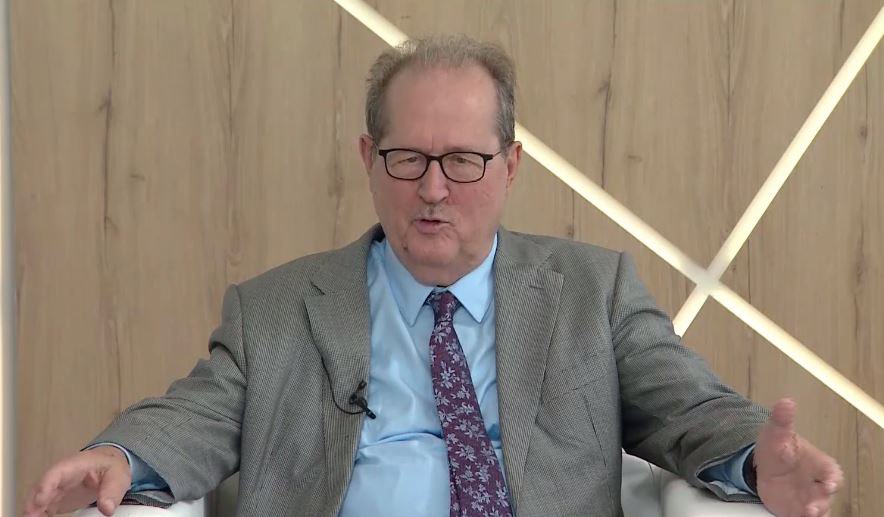
The regional governor Panagiotis Nikas spoke about the issues of energy security, the bet of de-lignitization as well as the tourism development strategy of the Peloponnese at the OT Forum broadcast live from the 86th Thessaloniki International Fair.
As Mr. Nikas said, it is extremely important that the Peloponnese is shielded energetically and in this direction renewable energy sources will be utilized and developed. Energy security is important for the development future which, according to Mr. Nikas, can be bright, as it is a region that, although one of the poorest in Europe, has a lot of potential.
Development steps
“We have 10 points that are world-famous”, said the regional governor and noted that tourism is one of the most important capitals in the development effort of the Peloponnese. “We are rolling out a strategy that was frozen during the two years of the pandemic. We are investing in degustation, we have developed five info points where everyone can get answers or help in dealing with problems, we are trying to improve our road network”.
Regarding the road network, Mr. Nikas made special reference to the Pylos-Kalamata connection, while he did not fail to mention that despite the fact that five programs were made available through the NSRF, the problem of the road network was not solved.
De-lignitization is still the goal
Regarding the lignite challenge, Mr. Nikas noted that the invasion of Ukraine is setting us back, but we have to make a decision that we need to end lignite. Besides, Megalopolis no longer has lignite, he added and referred to the de-lignitization and restoration plan of the area.
“In collaboration with the free university we are promoting plans for the development of the area which include the creation of a school and a park for sports activities. There are already 12 companies that want to invest in the area, and there is a relevant subsidy that helps. In addition, we replace asbestos roofs in cooperation with the Green Fund. All these are decisive steps for the development of the region”, said Mr. Nikas and added:
“As the money is available, Megalopolis can continue to be an energy and mainly transportation center that will connect the center with western and eastern Peloponnese”
Latest News

IMF: US Tariffs Shake Global Economy, Outlook Downbeat
IMF slashes global growth forecast to 2.8% as U.S. tariffs create uncertainty and ‘negative supply shock

First Step Towards New Audiovisual Industry Hub in Drama
The project is set to contribute to the further development of Greece’s film industry and establish Drama as an audiovisual hub in the region

Airbnb Greece – Initial CoS Ruling Deems Tax Circular Unlawful
The case reached the Council of State following annulment applications filed by the Panhellenic Federation of Property Owners (POMIDA)

Mitsotakis Unveils €1 Billion Plan for Housing, Pensioners, Public investments
Greek Prime Minister Kyriakos Mitsotakis has announced a new set of economic support measures, worth 1 billion euros, aiming to provide financial relief to citizens.

Alter Ego Ventures Invests in Pioneering Gaming Company ‘Couch Heroes’
Alter Ego Ventures' participation in the share capital of Couch Heroes marks yet another investment by the Alter Ego Media Group in innovative companies with a focus on technology.

Corruption Still Plagues Greece’s Driving Tests
While traffic accidents continue to claim lives on Greek roads daily, irregularities and under-the-table dealings in the training and testing of new drivers remain disturbingly widespread

Pope Francis Died of Stroke and Heart Failure Vatican Confirms
As news of the official cause of death spread, tributes poured in from across the globe. The 1.4 billion-member Catholic Church is united in grief, remembering a pope who championed inclusion, justice, and compassion

Increase in Both Museum Visits, Revenues for 2024
As expected, the Acropolis was the top archeological site in the country, followed by Sounion, Mycenae, the ancient theater of Epidaurus, and Vergina in northern Greece

Where Greece’s Tourists Come From: A Look at 2025’s Top Visitor Markets
The United Kingdom continues to hold the top spot as the largest source of incoming tourism, with 5.6 million seats booked for Greece this summer — up 2.2% from last year. This accounts for 20% of all international air traffic to Greece

Pope Francis: A Pontiff Who Reshaped the Papacy and Sparked a Global Conversation
His first words from the balcony of St. Peter’s Basilica—“Brothers and sisters, good evening”—set the tone for a pontificate that would challenge norms, favor mercy over dogma, and bring the papacy closer to the people.












![Πλημμύρες: Σημειώθηκαν σε επίπεδα ρεκόρ στην Ευρώπη το 2024 [γράφημα]](https://www.ot.gr/wp-content/uploads/2025/04/FLOOD_HUNGRY-90x90.jpg)



![Ξενοδοχεία: Μεγάλο το ενδιαφέρον για επενδύσεις στην Ελλάδα – Η θέση της Αθήνας [γραφήματα]](https://www.ot.gr/wp-content/uploads/2025/03/Athens-hotels-90x90.jpg)








![ΔΝΤ: Καμπανάκι για δημόσιο χρέος από δασμούς και αμυντικές δαπάνες [Γράφημα]](https://www.ot.gr/wp-content/uploads/2024/05/30859482_Sharone-perlstein-microfinanace-debt-800x500_c-600x375-1-1.jpg)















 Αριθμός Πιστοποίησης
Αριθμός Πιστοποίησης